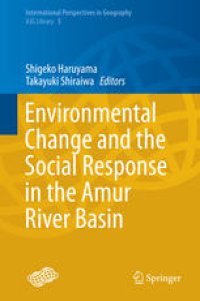
Ebook: Environmental Change and the Social Response in the Amur River Basin
- Genre: Biology // Ecology
- Tags: Environmental Geography, Hydrology/Water Resources, Geomorphology
- Series: International Perspectives in Geography 5
- Year: 2015
- Publisher: Springer Japan
- Edition: 1
- Language: English
- pdf
This book features research on historical land use and land cover in the Amur River Basin, which are important not only for residents there but also for those affected by its material and water cycles. Land use and land cover are affected by natural and human interactions over long and short timescales. The authors address historical changes in the land cover analysis of the Amur. The Amur region of Russia, land cover change analysis of the Amur, wetland, and flooding of the Amur provide evidence of land cover change. Changes of wetland and floodplain sedimentation processes demonstrate the influences of land cover change on fluvial environment, which are discussed with geomorphology. Water chemistry is showing the physical dimension of the geography of the Amur. The development process of timber harvesting in the Khabarovsk area and land use dynamics in the twentieth century are important evidence of development. The Amur poses an essential question: how can we manage a transboundary watershed without disturbing terrestrial and marine ecosystems for future generations? This book provides essential information for geographers about this relatively unknown region.
This book features research on historical land use and land cover in the Amur River Basin, which are important not only for residents there but also for those affected by its material and water cycles. Land use and land cover are affected by natural and human interactions over long and short timescales. The authors address historical changes in the land cover analysis of the Amur. The Amur region of Russia, land cover change analysis of the Amur, wetland, and flooding of the Amur provide evidence of land cover change. Changes of wetland and floodplain sedimentation processes demonstrate the influences of land cover change on fluvial environment, which are discussed with geomorphology. Water chemistry is showing the physical dimension of the geography of the Amur. The development process of timber harvesting in the Khabarovsk area and land use dynamics in the twentieth century are important evidence of development. The Amur poses an essential question: how can we manage a transboundary watershed without disturbing terrestrial and marine ecosystems for future generations? This book provides essential information for geographers about this relatively unknown region.